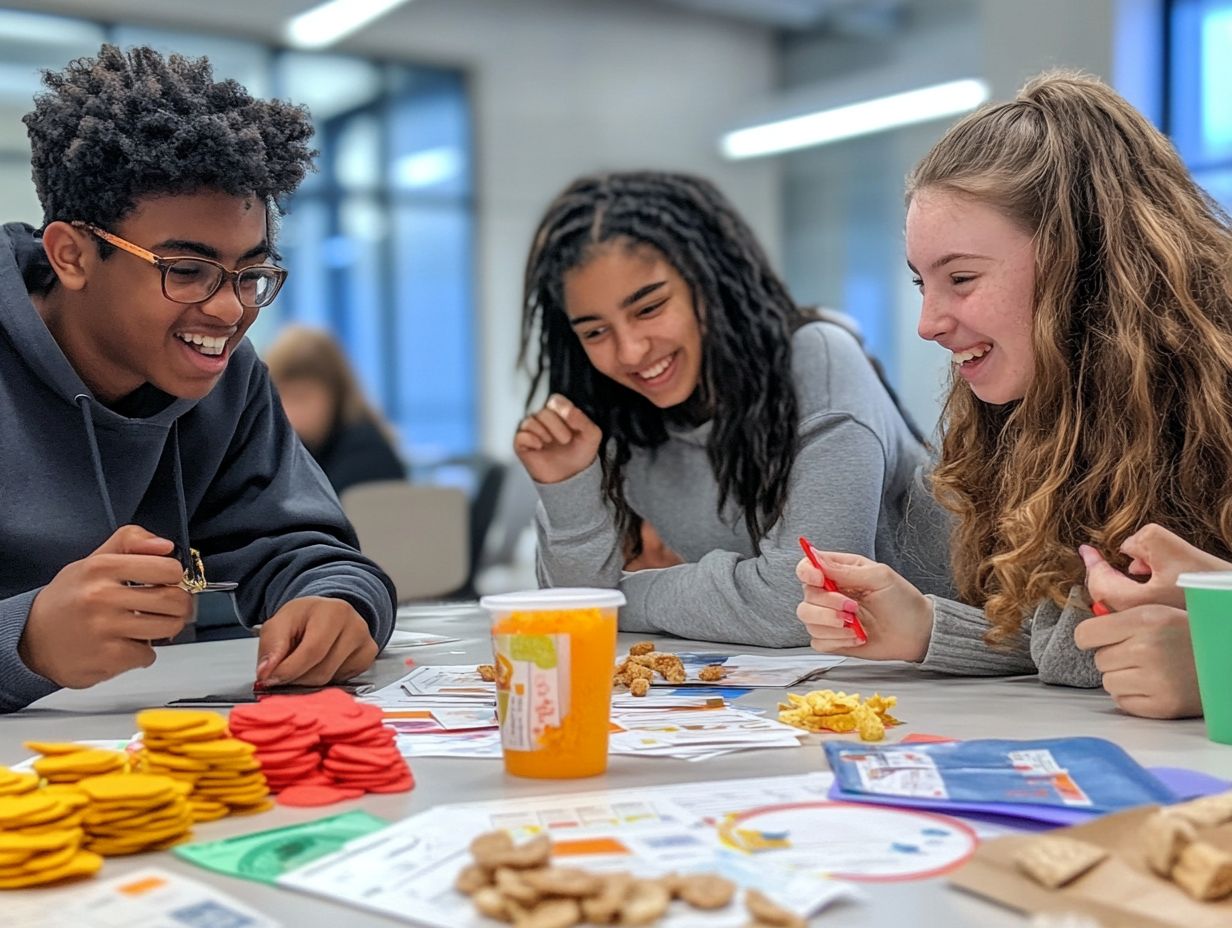5 Ways to Make Budgeting Fun for Teens
Budgeting can often feel overwhelming, especially for teens starting their journey towards understanding money basics and achieving financial independence.
But what if budgeting could actually be enjoyable?
This article explores five innovative strategies to make budgeting manageable and fun! From intriguing budgeting challenges to crafting creative vision boards, the goal is to help you develop healthy financial habits that lead to success.
We ll also cover common pitfalls to avoid, ways parents can lend their support, and practical applications of budgeting that help with tracking income and expenses effectively.
Get ready to transform how you think about money and enjoy budgeting!
Contents
- Key Takeaways:
- 1. Create a Budgeting Challenge
- 2. Use a Budgeting App
- 3. Make a Vision Board
- 4. Involve Your Friends
- 5. Set Rewards for Sticking to Your Budget
- Why Is Budgeting Important for Teens?
- Frequently Asked Questions
- How can I make budgeting fun for my teenager?
- What are some creative ways to save money as a teen?
- Why is it important for teens to learn budgeting skills?
- Can making a game out of budgeting be effective?
- How can I make budgeting more interactive for my teen?
- What should I do if my teen is resistant to budgeting?
Key Takeaways:

- Make budgeting fun by turning it into a challenge with friends. Set savings goals and rewards for sticking to your budget, and see who can save the most.
- Use budgeting apps to track expenses and set spending limits. They can make budgeting more visual and interactive for tech-savvy teens.
- Get creative with a vision board to visually represent your financial goals. This can motivate you and help you stay on track with your budget.
1. Create a Budgeting Challenge
Creating a budgeting challenge can be a rewarding and enlightening experience. It allows you to engage with your savings goals and develop a plan for how to manage your money, setting you up for future financial responsibilities.
To kick off this challenge, consider fun budgeting activities like the jellybean game. This exercise visually illustrates how much you can allocate from your total income to different spending categories, making budgeting more tangible.
This hands-on approach not only adds enjoyment to budgeting but also motivates you to track your income and expenses regularly. Using budgeting worksheets or apps can simplify your efforts, providing user-friendly templates and digital tools for monitoring your financial activities.
By setting clear goals, you ll gain deeper insight into your spending habits and develop a savings mindset that can benefit you for a lifetime.
2. Use a Budgeting App
Using a budgeting app can enhance your ability to track income and expenses, turning financial management into a more organized endeavor while improving your budgeting strategy. With the right resources, including budgeting games and educational materials, you can take control of your finances like never before.
You have various options available, allowing you to choose apps that cater specifically to your financial situation. Many of these apps come packed with features like:
- Spending categories you can adjust
- Visual spending reports
- Tracking savings goals essential tools for cultivating responsible financial habits.
By integrating these tools into your daily routine, you can better understand where your money goes, leading to smarter decisions. Plus, these budgeting apps often include educational resources that promote understanding money basics and smart credit card practices. This equips you with the skills necessary to build a solid savings foundation for your future.
Start your budgeting journey today and see how fun managing money can be!
3. Make a Vision Board
Creating a vision board can be a transformative experience for you. It inspires you to visualize your financial goals and turns the savings journey into something engaging and motivating. It s a way to achieve financial success while injecting a bit of fun into budgeting.
By crafting a visual representation of your aspirations, you can channel your creativity while clearly outlining your priorities in your budgeting strategy. This process becomes not just enjoyable, but also profoundly meaningful. For example, include images of dream purchases like a sleek new laptop or a shiny car. They serve as daily reminders of what you’re striving toward.
Setting milestones, such as saving a specific amount for a summer trip, encourages consistent effort and fosters smart financial habits. This technique helps you hone better budgeting skills, making it easier to track your progress through habit tracking and celebrate your achievements along the way.
4. Involve Your Friends

Involving your friends in budgeting discussions eases the peer pressure that often accompanies spending decisions. It also infuses a sense of fun and camaraderie into your financial planning. Together, you can establish shared goals and offer each other mutual support, ensuring effective management of your finances.
This collaborative approach enhances accountability, as each participant tracks their spending and savings while learning from one another s experiences. Engaging in activities like group challenges such as no-spend weekends or savings races can strengthen these connections even further.
By sharing money management tips, including insights from money influencers, and celebrating milestones together, you foster a genuine sense of community. As you and your friends share successes and setbacks, you create a supportive environment that encourages everyone to stay committed to their financial goals.
This makes the journey toward financial wellness not just achievable but genuinely enjoyable.
5. Set Rewards for Sticking to Your Budget
Setting rewards for sticking to a budget can be a game-changer for you. It turns the often intimidating budgeting process into an exciting savings challenge that encourages financial discipline.
By incorporating various reward systems, you can significantly enhance your enthusiasm and engagement in managing your finances. After hitting specific savings milestones, treat yourself now! Enjoy a favorite snack, have a movie night with friends, or indulge in a fun outing like bowling or mini-golf.
These incentives not only make the journey enjoyable but also foster a sense of accomplishment. As you start linking positive experiences with saving, you ll cultivate stronger financial habits. This proactive approach to budgeting benefits you for a lifetime, especially when applying strategies like the 50/30/20 rule, which suggests spending 50% of your income on needs, 30% on wants, and saving 20%.
Why Is Budgeting Important for Teens?
Budgeting is essential for you as a teen, as it establishes the groundwork for financial literacy. It helps you make informed spending decisions and enables you to set savings goals, ultimately achieving financial success all while fostering habits like spending minimalism that will benefit you well into adulthood.
When you take control of your finances early, you significantly reduce the risk of falling into the traps of impulse buying or accumulating debt. Learning about credit scores can also help you avoid these pitfalls. By learning to budget, you can save for a car or college expenses instead of relying on credit.
Developing a strong budgeting skillset now means you ll be better prepared to handle future financial challenges, like managing student loans or saving for a home, while keeping your living expenses in check.
This proactive approach cultivates greater financial stability, providing you with a sense of security and independence as you transition into adulthood.
What Are Some Common Budgeting Mistakes Teens Make?
Teens often make common budgeting mistakes, like overlooking necessary expenses and splurging on discretionary items. They may also fail to track their income and expenses. These missteps can hinder their journey toward financial literacy and long-term success.
The urge to buy the latest trends can seriously impact their budgets. Many young people underestimate the importance of saving for emergencies, leaving them vulnerable to unexpected situations.
To navigate these pitfalls, it s essential to craft a comprehensive financial plan. This should include goal setting and effective budgeting activities.
- Setting spending limits
- Creating an emergency fund
- Regularly reviewing and adjusting their budget
Talking about money with peers or adults can provide valuable insights. This helps teens appreciate the long-term benefits of money management, including the importance of savings account management.
How Can Parents Help Their Teens with Budgeting?

As a parent, you play a crucial role in helping teens build strong budgeting skills. Teach them about side jobs and additional income options.
By providing financial support and sharing valuable budgeting resources like podcasts or TikTok insights, you can foster an environment that prioritizes financial literacy and responsible money management.
Start open conversations about managing money. Discuss how to prioritize expenses and emphasize the importance of saving for future goals. Introduce educational resources, such as books or online courses, that empower them with the knowledge needed to make informed financial decisions.
Set a strong example through your own budgeting methods. Demonstrating transparent financial habits shows the significance of living within one’s means. This practical approach equips teens with essential skills and encourages them to view finances as a positive and manageable aspect of their lives. Consider exploring 5 ways to improve your budgeting skills for additional insights.
What Are Some Fun Ways to Track Expenses?
Tracking expenses can be fun! With budgeting games, interactive apps, and creative methods, you can enhance financial literacy in ways that resonate with teens.
Take budgeting apps like Mint or YNAB. They gamify the experience, offering rewards for reaching savings goals. Visually appealing charts make tracking finances much more engaging. Imagine creating colorful charts or graphs to monitor spending habits. This makes you feel more involved in your financial journey and adds a splash of creativity.
Spice things up by incorporating friendly competitions with your peers. This turns expense monitoring into a fun game and reinforces valuable lessons about saving and managing money. These engaging methods not only make tracking enjoyable but also cultivate a sense of responsibility and awareness in creating a sustainable budget.
How Can Teens Make Budgeting a Habit?
Developing a budgeting habit is crucial for teens aiming for financial success. You can achieve this through effective habit tracking, consistent budgeting strategies, and activities that foster financial awareness.
One effective technique is to set specific times each week to review spending habits and adjust your budget. By dedicating this time, you establish a routine and create valuable opportunities for reflection.
Using reminders can support you in forming this habit, ensuring you stay on track and don t overlook this vital task. Tracking your progress with apps or spreadsheets provides a clear visual representation of how your budgeting strategies are performing.
This level of consistency is essential. Being open to adapting your methods as your financial situation evolves will enhance your overall financial literacy and confidence.
What Are Some Real-Life Applications of Budgeting for Teens?
Understanding the real-life applications of budgeting enables you to make informed financial decisions regarding your income and expenses. Whether it’s managing a savings account or planning for college costs, this skill is invaluable.
This foundational knowledge also applies to various scenarios, such as setting aside funds from a side job. You ll learn to save for future goals like a car or travel, turning your dreams into achievable milestones.
Budgeting is essential when planning entertainment expenses. This allows you to enjoy outings without the stress of overspending.
By learning to allocate money for different needs and desires, you can navigate your financial landscape effectively, building habits that will benefit you in the long run.
Ultimately, mastering budgeting isn’t merely about managing money; it’s about cultivating a mindset that values responsible money management.
Frequently Asked Questions

-
How can I make budgeting fun for my teenager?
Involve your teen in the budgeting process! Allow them to brainstorm creative ways to save money and track expenses. This fosters a sense of ownership and makes budgeting enjoyable.
-
What are some creative ways to save money as a teen?
Encourage teens to set a budget for entertainment, seek out free or low-cost activities, use coupons, and apply the “one week rule” for non-essential purchases.
-
Why is it important for teens to learn budgeting skills?
Budgeting skills help teens develop responsible financial habits for the future. They learn the value of money and how to prioritize and manage their expenses effectively.
-
Can making a game out of budgeting be effective?
Absolutely! Turning budgeting into a game can engage teens. Create challenges or rewards for sticking to their budget, or even make it a friendly competition between siblings or friends.
-
How can I make budgeting more interactive for my teen?
Utilize budgeting apps or online tools. These often feature budgeting games, progress tracking, and personalized tips to keep the process engaging.
-
What should I do if my teen is resistant to budgeting?
Try to understand your teen’s reasons for resistance and address their concerns. Offering incentives or involving them in family financial decisions can also help them feel more invested in the process.
Start budgeting today and share your experiences with us!






